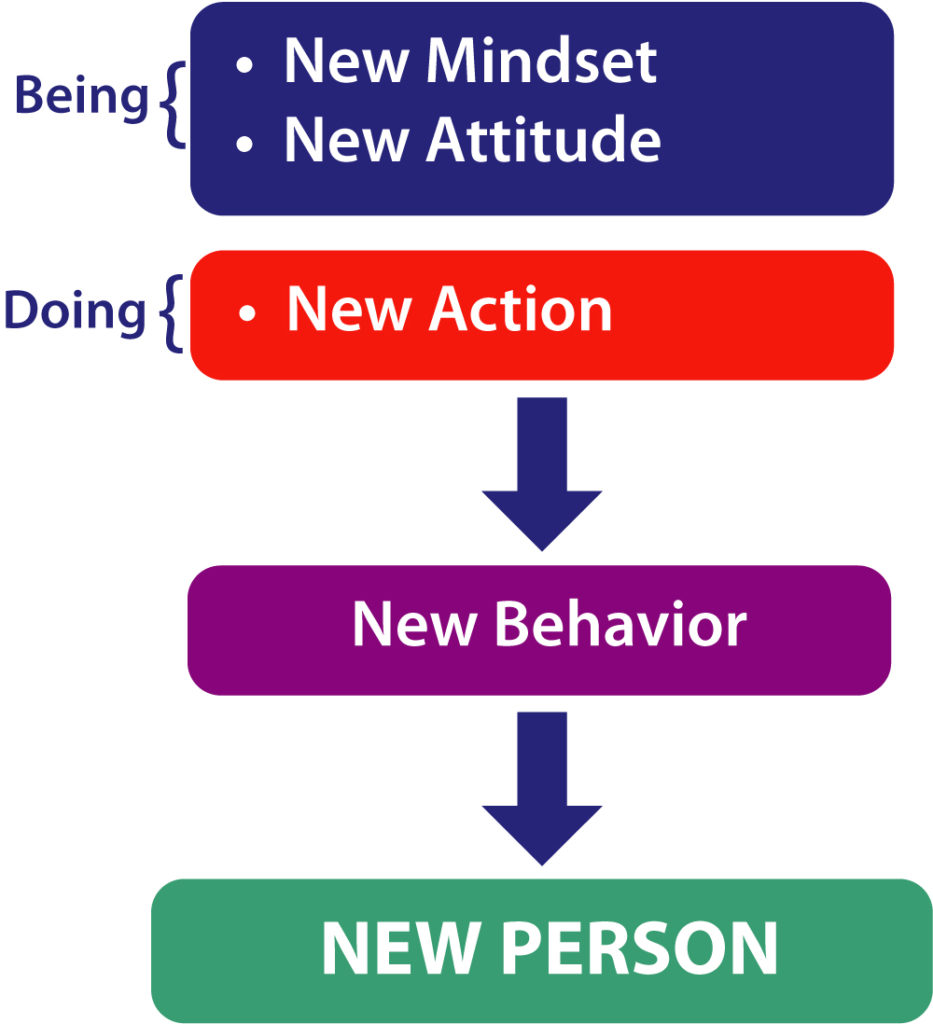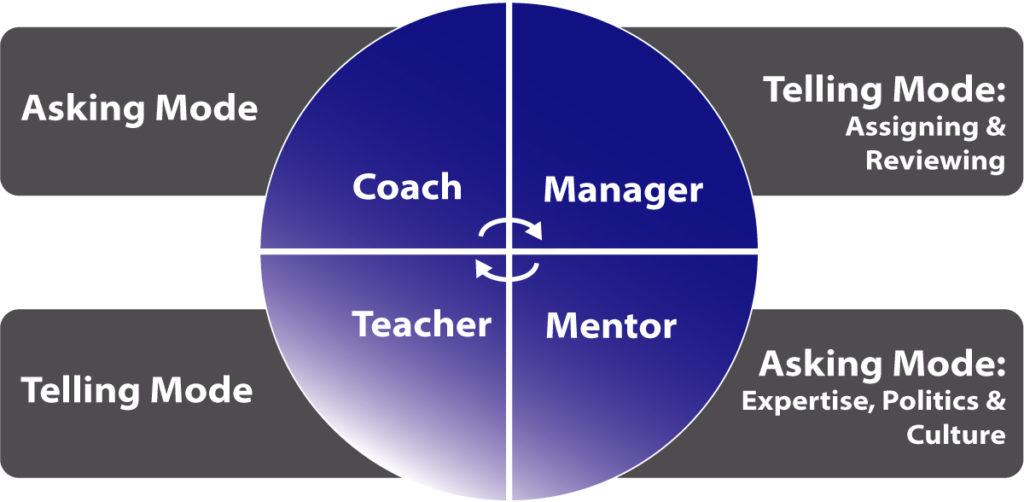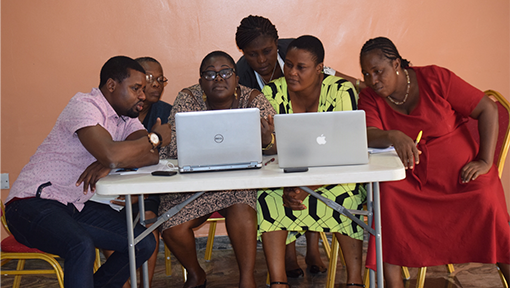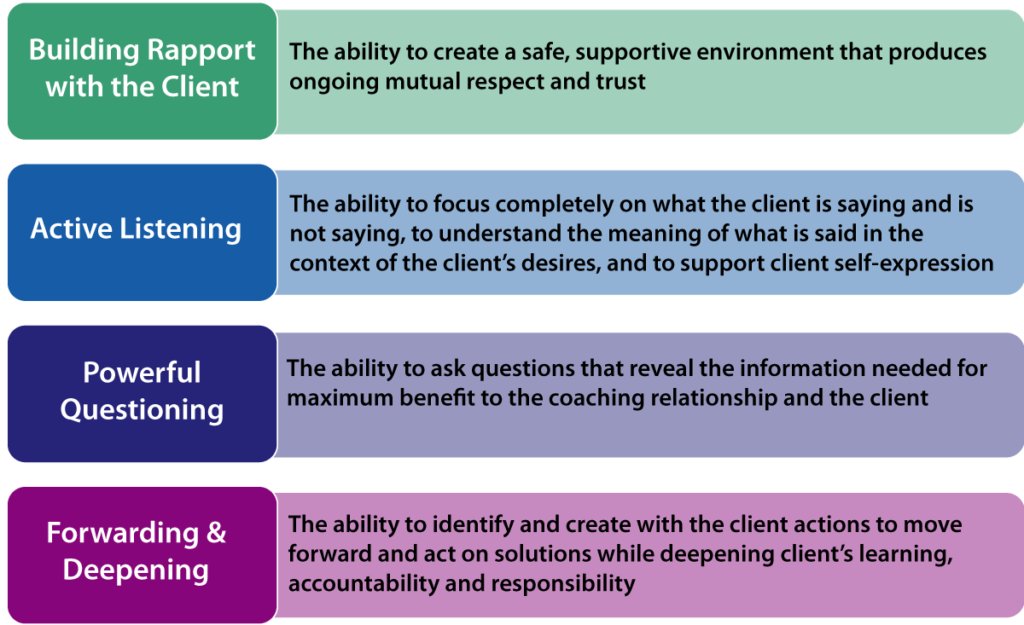TCI Global Toolkit: Coaching Essentials
The Transformational Power of Coaching- Home
- Help and Support
- Close
- Toolkits
- Global Toolkit
- AYSRH Toolkit
- Hub Toolkits
- Core High-Impact Practices
- Gender Essentials Mini Course
- Close
- Resource Collection
- Community of Practice
- Coaching
- Log In/Register
- My Profile
- English
This lesson outlines how coaching fits within broader human development interventions and the key competencies or skills required to make a good coach.
The role of coaching in transformative change
Coaching has the potential to yield long-lasting and sustainable improvements in personal performance and leadership. Why is this so?

Source: Adapted from Accelerated Coach Training Program, Benchmark Consulting, 2018.
Coaching goes beyond leading the coachee into knowing “what to do”. It leads him or her into realizing what kind of person s/he needs to BECOME in order to effect the change that s/he wants to see. Coaching addresses the BEING before the DOING – therefore leading into the development of a NEW PERSON. Coaching is, therefore, transformational!
How is coaching different from other human development interventions?
Coaching understandably is interchanged with different leadership roles as well as other one-on-one teaching-learning configurations. See a comparison chart below of mentor, consultant, counselor and coach.
The below graphic does a great job highlighting the main difference between coaches and other leaders. At the core, a coach believes that his/her coachee is a naturally creative, resourceful and whole person. As a result, they operate most often from a place of inquiry, asking the coachee powerful questions to help them identify solutions and next steps for themselves.

Therefore, coaches must possess the following characteristics:
- Be a partner/ facilitator
- Be client-led
- Believe that clients are naturally resourceful, have answers within themselves
- Create an environment for client growth through asking powerful questions
- A focus on the present and future, not the past
Key competencies of a coach
 Research shows that there is a need to find, hire and retain people with good soft skills. According to “Closing the Technology Leadership Gap” published in 2018, 67% of human resources (HR) representatives report withholding positions due to lack of soft skills. An internal study done by Google in 2013 revealed that 7 out of 8 of the most important job skills are soft skills. According to Indeed, soft skills include any skill that can be classified as a personality trait or habit. These often include:
Research shows that there is a need to find, hire and retain people with good soft skills. According to “Closing the Technology Leadership Gap” published in 2018, 67% of human resources (HR) representatives report withholding positions due to lack of soft skills. An internal study done by Google in 2013 revealed that 7 out of 8 of the most important job skills are soft skills. According to Indeed, soft skills include any skill that can be classified as a personality trait or habit. These often include:
- Communication
- Leadership
- Conflict Resolution
- Teamwork
- Empathy and integrity
- Problem solving
These are often the same skills that good coaches have.

Coaching competence.
What are the responsibilities of a coach?
Coaches serve as change agents. They are tasked with:
- Keeping the client at the center of the conversation
- Entering the relationship without knowing what the outcome will be
- Remaining curious
- Raising awareness
- Helping the client to action plan and set goals
What does coaching have to do with fixed and growth mindsets?
Over 30 years ago, psychologist Dr. Carol Dweck and her colleagues became interested in students’ attitudes about failure. They noticed that some students rebounded while other students seemed devastated by even the smallest setbacks. After studying the behavior of thousands of children, Dr. Dweck coined the terms fixed mindset and growth mindset to describe the underlying beliefs people have about learning and intelligence. When students believe they can get smarter, they understand that effort makes them stronger. Therefore, they put in extra time and effort, and that leads to higher achievement.
- People, their talents, skills, intelligence and qualities cannot be changed
- Believes that given and born talent alone leads to success, and effort is not required
- Avoids challenges
- Sees feedback as criticism
- Failure is a limit to ability and cannot be changed
- People can change their talents, abilities, skills and intelligence
- Willing to approach obstacles
- Welcomes feedback
- Able to adopt different effective problem-solving strategies
- Goal-oriented
- As a manager, provides developmental feedback to subordinates, in a safe manner
- Open, curious, flexible and client-centered
- Focus on the whole person
- Not a problem-solver, but a person developer: The client has the answers
- Evokes transformation
Recent advances in neuroscience have shown us that the brain is far more malleable than previously thought. Research on brain plasticity has shown how connectivity between neurons can change with experience. With practice, neural networks grow new connections, strengthen existing ones, and build insulation that speeds transmission of impulses. These neuroscientific discoveries have shown us that we can increase our neural growth by the actions we take, such as using good strategies, asking questions, practicing, and following good nutrition and sleep habits.
As a result, TCI-trained coaches use different strategies to ensure coachees lead the engagement, specifically the learning process, by helping them to see opportunities instead of problems. Coaches ask thought-provoking or powerful questions to allow for creation, adaptation and innovation instead of reaction. Coaches find opportunities to build psychological safety for the coachee to practice new skills.
How is TCI coaching different from technical assistance?
According to Britannica, technical assistance is a “form of aid given to less-developed countries by international organizations such as the United Nations (UN) and its agencies, individual governments, foundations, and philanthropic institutions. Its object is to provide those countries with the expertise needed to promote development.” Traditionally, this has been a very top-down approach in which the international organization comes in to “fix” something and often ignores and overlooks local knowledge and expertise. Although this thinking is shifting, it is ingrained in the global health sector and change is slow.
In response to this often ineffective and unsustainable approach, TCI has adopted coaching as its primary method of capacity strengthening. As a result, TCI coaches do not implement programs; rather, they serve as resources and advisors to city teams, helping them leverage existing structures and systems to solve problems. The city teams lead the design, management and implementation of high-impact best practices, and the TCI coaches support these efforts.
TCI APP USERS PLEASE NOTE
You will only receive CERTIFICATES by email – when earning a score above 80% – and will not be able to view or print a certificate PDF from the TCI app.
Test Your Knowledge
Earn a Certificate
Quiz Summary
0 of 5 Questions completed
Questions:
Information
You have already completed the quiz before. Hence you can not start it again.
Quiz is loading…
You must sign in or sign up to start the quiz.
You must first complete the following:
Results
Results
0 of 5 Questions answered correctly
Your time:
Time has elapsed
You have reached 0 of 0 point(s), (0)
Earned Point(s): 0 of 0, (0)
0 Essay(s) Pending (Possible Point(s): 0)
Categories
- Not categorized 0%
- 1
- 2
- 3
- 4
- 5
- Current
- Review
- Answered
- Correct
- Incorrect
-
Question 1 of 5
1. Question
An effective coach…
CorrectIncorrect -
Question 2 of 5
2. Question
True or False: TCI Coaching is the same thing as counseling and consulting.
CorrectIncorrect -
Question 3 of 5
3. Question
A “safe and supportive environment with respect and allowing trust” describes which of the following coaching competencies?
CorrectIncorrect -
Question 4 of 5
4. Question
A growth mindset consists of all of the following EXCEPT:
CorrectIncorrect -
Question 5 of 5
5. Question
How is TCI coaching different than technical assistance, according to Victor Igharo?
CorrectIncorrect



